 Petzlover
Petzlover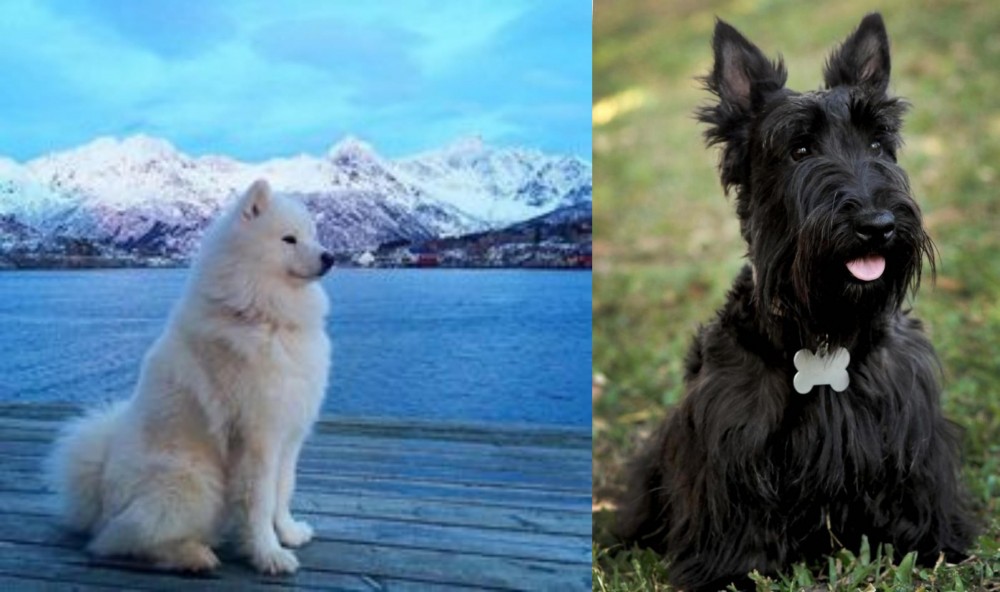 Samoyed is originated from Russia but Scoland Terrier is originated from United Kingdom. Samoyed may grow 33 cm / 13 inches higher than Scoland Terrier. Samoyed may weigh 20 kg / 45 pounds more than Scoland Terrier. Both Samoyed and Scoland Terrier has almost same life span. Both Samoyed and Scoland Terrier has same litter size. Samoyed requires Moderate Maintenance. But Scoland Terrier requires High Maintenance
Samoyed is originated from Russia but Scoland Terrier is originated from United Kingdom. Samoyed may grow 33 cm / 13 inches higher than Scoland Terrier. Samoyed may weigh 20 kg / 45 pounds more than Scoland Terrier. Both Samoyed and Scoland Terrier has almost same life span. Both Samoyed and Scoland Terrier has same litter size. Samoyed requires Moderate Maintenance. But Scoland Terrier requires High Maintenance
 The Samoyed is a large breed of dog; a spitz-type dog, with a thick, double-layer coat. The dog was used to help with herding and to also haul sledges for the Siberian Samoyede people.
The Samoyed is a large breed of dog; a spitz-type dog, with a thick, double-layer coat. The dog was used to help with herding and to also haul sledges for the Siberian Samoyede people.
The Samoyed has been used in polar expeditions, including Sir Ernest Shackleton's journey to the Antarctic. They’ve put up with a lot of hardships on these journeys and some of them have lost their lives on these expeditions.
The first standard for the breed was adopted in England in 1909, and in 1923 the original Samoyed Club of America was established.
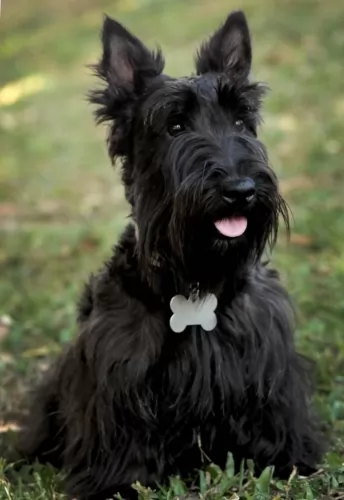 Not much is known about the Scoland Terrier. It is not a purebred but rather a crossbreed developed by crossing the Scottish Terrier with the Westland Terrier. To understand these mixed breeds, look to the original breeds for any combination of the characteristics of the breeds. The offspring of this crossing is not a 50-50 split of the original breeds looks or temperament.
Not much is known about the Scoland Terrier. It is not a purebred but rather a crossbreed developed by crossing the Scottish Terrier with the Westland Terrier. To understand these mixed breeds, look to the original breeds for any combination of the characteristics of the breeds. The offspring of this crossing is not a 50-50 split of the original breeds looks or temperament.
Because the Scoland Terrier is a mix between the Scottie and the Westie he has all the characteristics of a typical terrier perhaps even twice as much. With both parents being terriers, you can expect your Scoland to act like a short legged terrier. These dogs are known for their courage and tenacity. Today these terriers are family companions. Most terriers today come from a pool of ancestral dog in the 19th century in Europe. This information was gleaned from a genetic analysis done in 2006.
The Scoland Terrier, being a hybrid, is not acknowledged by the American Kennel Club (AKC) or the United Kennel Club (UKC). It is acknowledged by the International Designer Canine Registry (IDCR), American Canine Hybrid Club (ACHC), Dog Registry of America, Inc. (DRA), Designer Dogs Kennel Club (DDKC) and Designer Breed Registry (DBR).
 The Samoyed is a large herding dog standing at between 48 to 60cm in height and weighing 16 – 30kg. He has a thick, double layer coat that is silvery white.
The Samoyed is a large herding dog standing at between 48 to 60cm in height and weighing 16 – 30kg. He has a thick, double layer coat that is silvery white.
The top layer is fairly long and coarse. The dog sheds heavily once or twice a year, but the dog is described as being hypoallergenic.
The ears of the dog are typical spitz-like – erect. The eyes of the dog are almond in shape and while they are usually brown, they can sometimes be blue too. The tail is long and curls over the dog’s back. When these dogs sleep in the snow, you might notice the tail is folded so that it covers the dog’s nose.
The Samoyed is a friendly dog, to such an extent that you wouldn’t call him a good watchdog. They’re friendly dogs with happy expressions on their faces. They make great family pets and will get on well with children as well as other dogs in the home.
Like all dogs, the Samoyed will need early training and socialization to make him obedient and well rounded. He is intelligent and can easily learn a few basic commands.
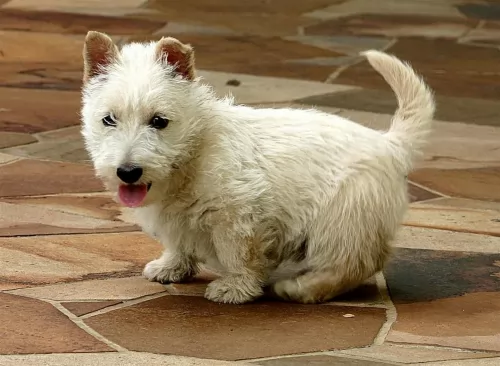 Being a hybrid, the Scoland Terrier will not always look alike and could look like a Scottie, a Westie or a combination of the two. Most breeders of this designer dog say it usually has a body like the Scottie and a round head like the Westie. They are more often black with white markings, but they can often be wheaten as well. With round dark eyes, a scissors bite and black nose, her face is unique. The breed has erect and small, triangular ears and a medium fluffy tale. The coat is hard and wiry, with a dense soft undercoat.
Being a hybrid, the Scoland Terrier will not always look alike and could look like a Scottie, a Westie or a combination of the two. Most breeders of this designer dog say it usually has a body like the Scottie and a round head like the Westie. They are more often black with white markings, but they can often be wheaten as well. With round dark eyes, a scissors bite and black nose, her face is unique. The breed has erect and small, triangular ears and a medium fluffy tale. The coat is hard and wiry, with a dense soft undercoat.
 The Samoyed is a gentle, easy going dog that gets on well with everyone, loving children and being prepared to be friendly towards other dogs too.
The Samoyed is a gentle, easy going dog that gets on well with everyone, loving children and being prepared to be friendly towards other dogs too.
His friendliness makes it that he doesn’t make a good watchdog. He is intelligent and can be trained to obey basic commands.
He loves plenty of exercise, after all he has always been a working dog. Apart from the coat which will require quite a bit of upkeep, the Samoyed is prepared to come into your home and make you a splendid pet and companion.
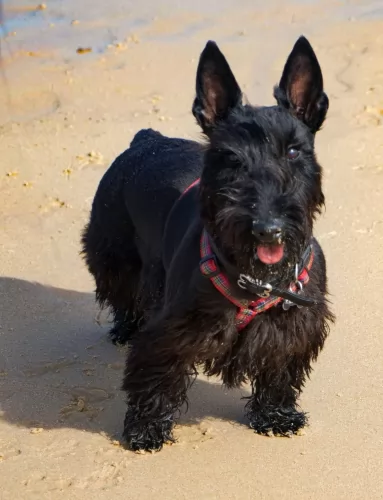 1.Children friendliness - they can be very good with children and children can help them get their exercise.
1.Children friendliness - they can be very good with children and children can help them get their exercise.
3.Adaptability - yes but she is adept at digging and must have a safe enclosure.
 Dogs can get diabetes just like people can. Diabetes is becoming more common in dogs as people try and feed their dogs ‘treats’ such as chocolates, biscuits and ice-cream.
Dogs can get diabetes just like people can. Diabetes is becoming more common in dogs as people try and feed their dogs ‘treats’ such as chocolates, biscuits and ice-cream.
Fortunately diabetes is manageable. Certainly, if you discover signs of diabetes in your pet, get him to the vet. The typical symptoms of diabetes in dogs are increased urination, increased thirst and weight loss. Cataracts and blindness can also occur.
Glaucoma is when there is increased pressure in the eye. It can be hereditary or secondary where there is decreased fluid in the eye because of other eye diseases. Symptoms include pain and even vision loss. It can be treated surgically or with eye drops.
This is an inherited condition in dogs where the thighbone doesn't fit properly into the hip joint. Some dogs will even have lameness in both rear legs. The vet will want x-rays to diagnose hip dysplasia. Unfortunately arthritis can also develop.
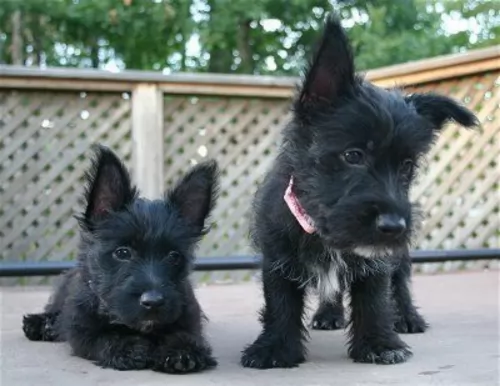 This hybrid dog can inherit any of the issues faced by its two parent breeds. For the Scoland Terrier this can include:
This hybrid dog can inherit any of the issues faced by its two parent breeds. For the Scoland Terrier this can include:
• Seborrhea – Skin disease that can cause dogs to scratch until bleeding and/or infected.
• Carniomandibular Osteopathy -called lion’s jaw this is a developmental disease that causes extensive changes in the bones of the mandible and skull.
• Pulmonic Stenosis – when the blood flowing from the heart’s right ventricul to the pulmonary artery is blocked.
• PPM or Persistent Pupillary Membranes - causes visual impairment when the membranes do not dissolve after birth.
• Chronic Hepatitis – disease of the liver that can eventually cause major damage.
 The coat of the dog is super thick and in the Spring, the dog sheds a lot. Samoyed dog owners will need to be regular with their brushing routine with these dogs as the coat can easily tangle. Some people just prefer to get their Samoyed to a professional groomer.
The coat of the dog is super thick and in the Spring, the dog sheds a lot. Samoyed dog owners will need to be regular with their brushing routine with these dogs as the coat can easily tangle. Some people just prefer to get their Samoyed to a professional groomer.
This is a working dog, used to working hard in all kinds of conditions. He doesn’t take kindly to being bored with nothing to do and he howls and barks till you take him on a walk. He requires regular exercise such as hiking, ball games, running and swimming. It is why this dog isn’t suited to life on a small property in the city. He requires a large garden or farm and lots of exercise.
If you want your Samoyed to be healthy so that you’re not constantly at the vet, provide him with top quality food. It is always useful and convenient having commercially manufactured food but you want to vary the diet just a bit by providing some homemade food too.
If you boil chicken, brown rice or pasta and spinach, sweet potatoes and carrots in a pot you can chop it all up and freeze it and feed portions twice a week to your dog. Warmed up it can be added to his dry kibble and be a wonderful tasty treat for him. Every now and then you can also include some raw meat which can be beneficial for his skin. Ensure there is always a bowl of fresh, cool water within his reach.
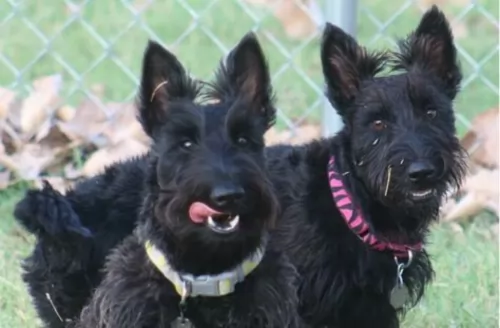 1.Feeding the puppy - Give a high quality puppy dog food designed for terriers or active medium sized dogs. Give ¾ of a cup over 3 meals a day.
1.Feeding the puppy - Give a high quality puppy dog food designed for terriers or active medium sized dogs. Give ¾ of a cup over 3 meals a day.
2.Feeding the adult – Give a high quality adult dog food designed for terriers or active medium sized dogs. Give one cup over two meals a day.
4. Games and Exercises – The Scoland Terrier is a very active dog and needs daily exercise, He need time to play, run, and be stimulated by games. She would be very good at flyball, Frisbee, fetch, agility, barn hunt, and obedience. He needs at least 2 hours of play and exercise everyday.